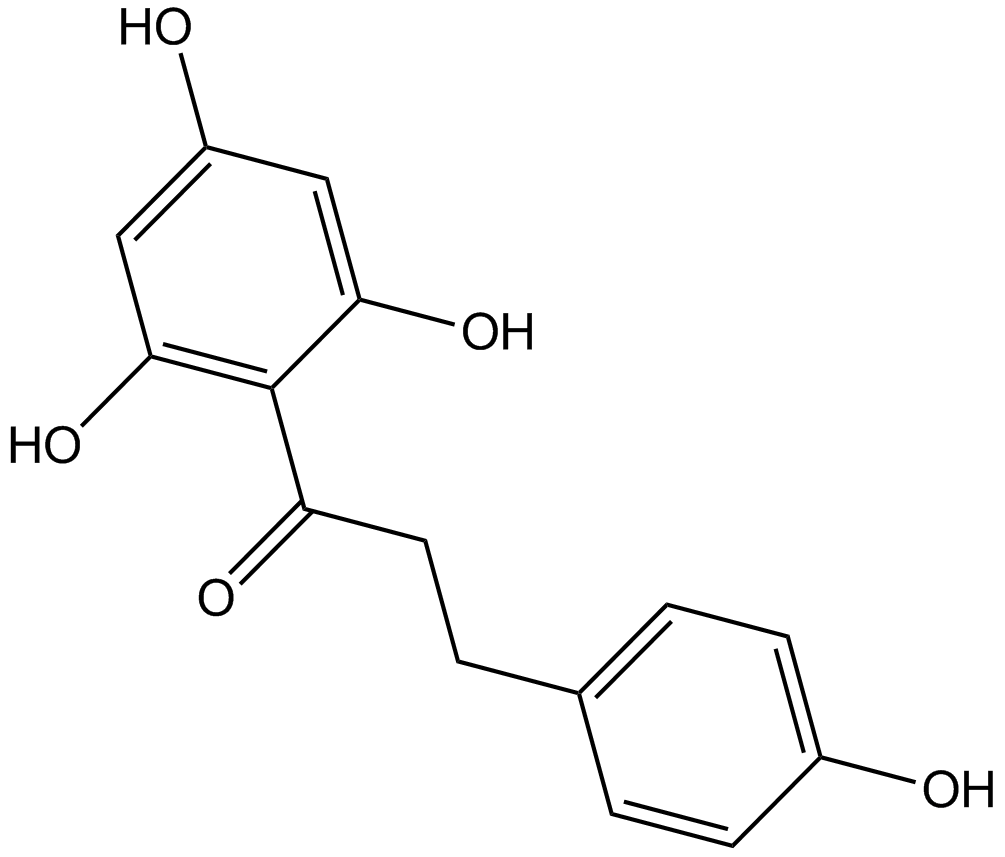Phloretin (Synonyms: NSC 407292, RJC 02792) |
| Catalog No.GC17976 |
A natural inhibitor of various transporters
Products are for research use only. Not for human use. We do not sell to patients.

Cas No.: 60-82-2
Sample solution is provided at 25 µL, 10mM.
Phloretin is a dihydrochalcone, a type of natural phenols which can be found in apple tree leaves and Manchurian apricot. Phloretin inhibits the active transport of glucose into cells via sodium-glucose linked transporter (SGLT) 1 and 2 with IC50 value of 49±12 μM [2].
SGLTs are a family of glucose transporter which is found in the small intestine mucosa (SGLT 1) and nephron proximal tubule (SGLT 2). They contribute to the renal glucose reabsorption.
After treatment of phloretin, differentiated 3T3-L1 cells exhibited significantly enhanced glycerol and the inhibition of adipogenesis-related transcription factor that were regulated by SGLTs. Additionally, phloretin promoted phosphorylation of AMP-activated protein kinase and increased activity of adipose triglyceride lipase and hormone-sensitive lipase [1]. When RAW 263.7 cells were cultured from differentiated 3T3-L1 cell media, PT suppressed the SGLT-associated nuclear transcription factor kappaB and mitogen-activated protein kinase pathways [1].
In streptozotocin-induced rat model of diabetes type I, oral administration of phloridzin (5/10/20/40 mg/kg/day) resulted in significant reduction of blood glucose levels and improved dyslipidemia. Additionally, Administration of phloridzin reduced urine volume and water intake in a dose-dependent manner [3].
References:
[1] Huang W C et al. , Phloretin and phlorizin promote lipolysis and inhibit inflammation in mouse 3T3-L1 cells and in macrophage-adipocyte co-cultures. Mol Nutr Food Res. 2013, 57: 1807-1817.
[2] Kasahara T, Kasahara M. Expression of the rat GLUT1 glucose transporter in the yeast Saccharomyces cerevisiae. Biochem J. 1996, 315 ( Pt 1):177-182.
[3] Najafian M, Jahromi M Z, Nowroznejhad M J, Phloridzin reduces blood glucose levels and improves lipids metabolism in streptozotocin-induced diabetic rats. Mol Biol Rep. 2012, 39(5): 5299-306.
Average Rating: 5 (Based on Reviews and 30 reference(s) in Google Scholar.)
GLPBIO products are for RESEARCH USE ONLY. Please make sure your review or question is research based.
Required fields are marked with *




















